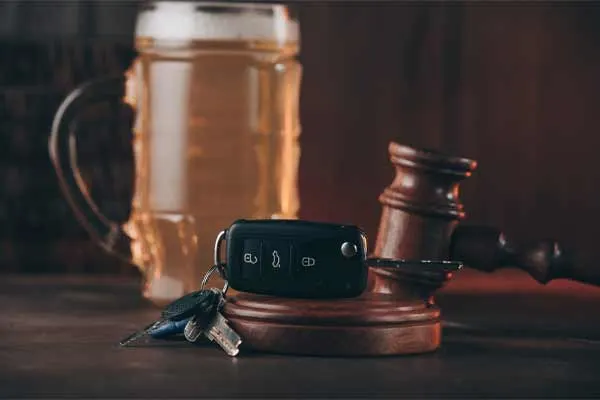Since driving under the influence of alcohol or drugs is a Class A misdemeanor offense, there’s a ton of questions about drunk driving charges and license revocation and license suspension in Illinois. Besides the possibility of spending up to one year in prison and/or a maximum fine of $2,500, a drunk driving conviction automatically results in the loss of your driving privileges.
The first DUI criminal conviction will receive a short revocation period. Upon a second DUI conviction, you’ll still face a minimum 1-year revocation period if the two DUI convictions occurred 20 years apart. If the second DUI offense occurs less than 20 years after the first crime, however, you’ll face a minimum 5-year revocation period.
If you’re convicted of a third drunk driving conviction, no matter when it occurs, you’ll receive a minimum 10-year revocation period. For any additional drunk driving convictions, you’ll lose your driver’s license for life. If you are facing drunk driving charges in Illinois, it’s essential to speak with an experienced criminal defense lawyer to get a favorable outcome for your unique situation.
At Dohman Law Group, our experienced DUI criminal defense attorneys can help you get your license back after a DUI. We have helped thousands of drunk drivers facing DUI charges in Lake County, Cook County, Kendall County, Kane County, DuPage County, and throughout Illinois beat their drunk driving charges and we can help you, too. For a no-cost case review, contact our Rolling Meadows criminal defense law firm today at 847-616-9993.
What Is the Difference Between a License Suspension and License Revocation?
A driver’s license suspension involves the temporary loss of driving privileges for a specific period of time. At the end of the suspension period, your driver’s license is automatically reinstated after paying the required license reinstatement fee.
A license revocation entails the indefinite loss of driving privileges. Here. there’s no ‘automatic’ license reinstatement even after the period of license revocation ends. Instead, you become ‘eligible’ for license reinstatement and can’t drive until first appearing at a court hearing before the Illinois Secretary of State and being awarded driving privileges. The minimum period of license revocation – before an individual becomes eligible for reinstatement – depends on factors, such as the DUI offense that caused the revocation and a driver’s driving record.
Certain DUI offenses may lead to a suspension, while more serious DUI offenses may lead to a revocation. Examples of offenses that may lead to suspension:
- 3 or more minor traffic moving violations within a 12-month period for drivers 21 years of age or older
- 2 or more minor traffic moving violations within a 24-month period for underage drivers
- Possession of an ID or driver’s license belonging to another person
- Eluding or fleeing a law enforcement officer
- Fleeing the scene of a motor vehicle accident where property damage exceeds $1,000
- 2 convictions for open containers within 1 year
- Possession of cannabis, a controlled substance, or methamphetamine while operating a motor vehicle.

Examples of offenses that may cause revocation include:
- Drunk driving conviction
- Fleeing the scene of a car accident resulting in personal injury or death
- Street racing or drag racing
- Aggravated eluding and fleeing law enforcement officer, including speeding 21 miles per hour or more over the speed limit, property damage of $300 or more; disobeying 2 or more traffic control devices
- Two convictions for illegal transportation of open liquor where the offender is under age 21
- Any felony offense involving the operation of a motor vehicle.
What Type of Hearing Do You need to Get Back Your driving privileges?
The Illinois Secretary of State conducts two types of hearings: formal hearing and informal hearing. Formal hearings are conducted when:
- The offender has more than one revocation or suspension stemming from more than one DUI conviction.
- The ground for the revocation is a criminal offense involving a death.
- The offender is seeking a rescission or modification of a court order of revocation or suspension.
- An out-of-state application for license reinstatement.
- The person has had a Monitored Device Driving Permit (MDDP) or a breath alcohol ignition interlock device (BAIID) cancelled and now wishes to be considered for issuance of a hardship license or Restricted Driving Permit (RDP).
How Do I Get Back My Suspended License in Illinois?
There are no specific requirements for drivers to get their suspended or revoked license reinstated in Illinois. The reinstatement process largely depends on the reason your driver’s license was suspended or revoked, and factors such as your driving record. Typically, you must:
- Pay a reinstatement fee.
- Meet any specific requirements made by the criminal court.
Reinstating a suspended license is a daunting task, and there are many more steps to follow. For example, to get your driver’s license reinstated after an intoxicated driving conviction, you must:
- Have maintained a clean driving record.
- Undergo an alcohol and drug treatment program and if you have a substance abuse problem, you must submit proof of substance abuse treatment.
- Complete a recommended alcohol or drug education program.
- Meet with a formal hearing officer from the Illinois Secretary of State office.
- File proof of financial responsibility.
- Pay a $500 license reinstatement fees and an application fee. However, if you request formal hearings for driver’s license reinstatement, you’ll have to pay a $50 nonrefundable filing fee.
- Pass a written exam, driving exam, and a vision exam.
Your license will only become valid after it’s entered on your driving history in the Illinois Secretary of State office.
Losing your driving privileges is a devastating experience because of the harsh criminal penalties you may face; keep people from breaking traffic rules again. To avoid all these harsh consequences, drive safely.
Related: Driving With A Revoked Or Suspended License In Illinois
Why Could the Illinois Secretary of State Deny Me Driving Relief?
The Illinois Secretary of State follows technical and complicated rules to make decisions about granting or denying driving privileges. Not complying with any of these rules might lead to a denial of your application for reinstatement.
Many of these license reinstatement hearings are adversarial, which means they’re contested. At a formal hearing, you’re placed under oath and subject to cross-examination by an experienced attorney representing the Illinois Secretary of State’s office and further subject to questioning by a formal hearing officer. Your application for reinstatement may be denied if your testimony doesn’t satisfy the formal hearing officer or is inconsistent with the information in your alcohol evaluation and/or with the details of your drunk driving arrest or your alcohol dependence.

Also, your application for reinstatement could be denied even if your evidence and testimony are consistent with the alcohol evaluation and other evidence you present to the formal hearing officer, especially if the hearing officer believes that the evidence contradicts your drug use history, results of any chemical testing or other information.
After I’m Granted Driving privileges, How Long Does it Take to Receive My RDP?
If the Secretary of State grants you an RDP, they’ll provide you with a list of requirements you must complete and submit before issuing your restricted driving permit. You must complete all requirements and submit a report as quickly as possible. Once you’ve submitted all requirements to the Secretary of State, it takes 3-5 weeks to get the actual restricted driving permit in the mail. For instance, you must get SR-22 insurance coverage and pay your reinstatement fees. Often, once these requirements are submitted, you’ll get your driver’s license after 2-3 business days.
Under the law, if granted an RDP, you must complete the requirements within 90-days after issuing the court order. You must complete the requirements to get full reinstatement 1-year of the hearing order.
How Can a DuPage County License Reinstatement Lawyer Help?
Clearly, the reinstatement process is complex. There are multiple factors to consider; for example, you need to set up your initial formal hearing or informal hearing. Also, you must prove undue hardship and you must prove that you aren’t a danger to public safety.
Further, you must understand the payment associated with the reinstatement process.
Not only can an experienced Rolling Meadows DUI criminal defense attorney help you through the license reinstatement process, but they can also fight to make sure you get a favorable outcome. Contact Dohman Law Group today at 847-616-9993 to see how our experienced traffic attorneys in Rolling Meadows can help.
Contact Our Experienced Rolling Meadows Driver’s License Reinstatement Attorneys Today for Legal Advice!
Depending on the reason your driver’s license is suspended or revoked, have an experienced attorney help you with the reinstatement hearing process of getting your driver’s license reinstated. If you have been arrested for drunk driving, it’s in your best interest to have a lawyer on your side to defend you in any license reinstatement hearings and in court.
Losing your driving privilege is just part of the consequences of impaired driving. You’ll want an experienced attorney to help you face any formal hearings you will go through to get driving relief or license reinstatement. When facing drunk driving charges, you will also want a Rolling Meadows DUI defense lawyer to help you handle the criminal charges you’re also facing. Call the Dohman Law Group today at 847-616-9993 to learn how we can help with your charges.


